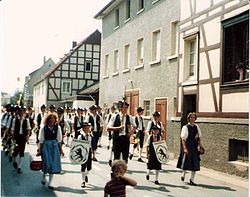Ebersberg
| Ebersberg | ||
|---|---|---|
 |
||
|
||
| Coordinates: 48°05′N 11°58′E / 48.083°N 11.967°ECoordinates: 48°05′N 11°58′E / 48.083°N 11.967°E | ||
| Country | Germany | |
| State | Bavaria | |
| Admin. region | Oberbayern | |
| District | Ebersberg | |
| Government | ||
| • Mayor | Walter Brilmayer (CSU) | |
| Area | ||
| • Total | 40.84 km2 (15.77 sq mi) | |
| Elevation | 558 m (1,831 ft) | |
| Population (2015-12-31) | ||
| • Total | 11,935 | |
| • Density | 290/km2 (760/sq mi) | |
| Time zone | CET/CEST (UTC+1/+2) | |
| Postal codes | 85560 | |
| Dialling codes | 08092 | |
| Vehicle registration | EBE | |
| Website | www.ebersberg.de | |
Ebersberg is the seat of the similarly named Ebersberg Landkreis (district) in the Oberbayern Regierungsbezirk (administrative region) in Bavaria, southern Germany. The Ebersberger Forst (forest) is one of Germany’s largest continuous area of woodlands.
Neighbouring communities are Grafing bei München, Kirchseeon and Steinhöring. Bavaria’s capital, Munich, lies 32 km away and may be reached by Munich S-Bahn (S4). Rosenheim and Wasserburg am Inn are about the same distance away.
Ebersberg’s history is closely tied with the nearby Benedictine monastery founded in 934 by the Counts of Sempt. Beginning in the 14th century the monastery exercised local jurisdiction. In 1595, Pope Clement VIII dissolved the monastery and turned its lands over to the Jesuits. On January 18, 1634, during the Thirty Years War, Ebersberg was the site of a skirmish between Habsburg troops and local peasants. The peasants, being poorly armed, were quickly defeated by the Imperial forces and around 200 were killed. Later, the ringleaders were exonerated by local authorities and found they were acting only in self-defense. In 1773, the Knights of Malta took over the building. When the monastery was dissolved for good in 1808, the building went partly to government ownership and partly private.
In 1954, Ebersberg was raised to the status of a 'town'. In 1972 it was connected to Munich by the S-Bahn highway. The once separate municipality of Oberndorf was combined with Ebersberg.
Ebersberg is the only German town that has named a street after a cabaret group (Valtortagasse, after the Gruppo di Valtorta from Ebersberg). Ebersberg’s main cultural institution, the Alte Kino Ebersberg (Old Cinema), is today run by a non-profit governing board whose roots lie in this same Deutscher Kleinkunstpreis-winning group.
...
Wikipedia



